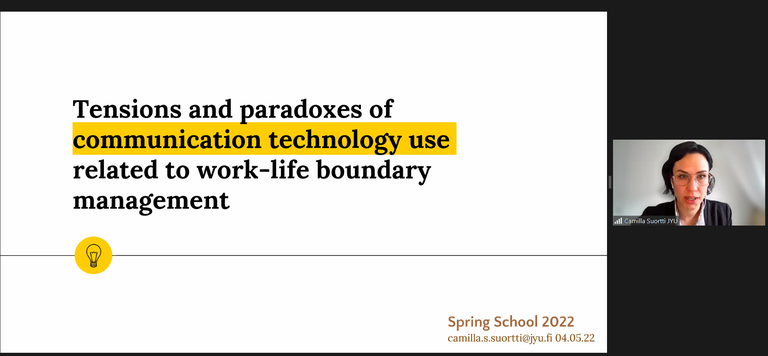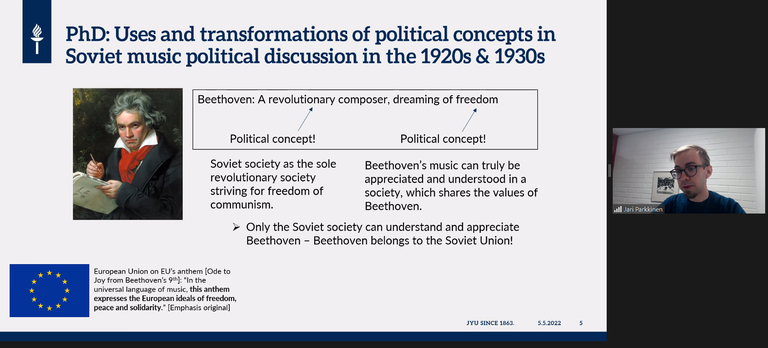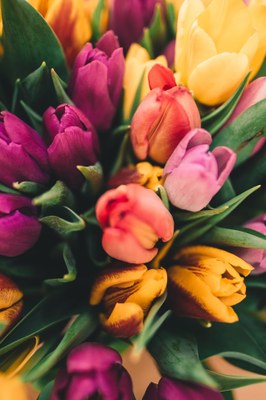Spring School 2022: ongoing research and thinking about academic career from a new perspective
Writer: Emilia Rajala
Wednesday 4.5.
Spring school, a traditional mini conference organised by Language campus doctoral students, was opened by the coordinator of the Spring School, Karina Doi. This was followed by keynote on “Academic career” by Professor Camilla Lindholm and Docent, PhD Johanna Isosävi. They shared some insights into what to do and expect after doctoral training. Career possibilities mentioned included academic career, hybrid career and expert career. Lindholm and Isosävi highlighted the importance of supervision for doctoral students and networking with other researchers already during the PhD process. They recommended doctoral students take time to think about their transferable skills in order to prepare for academic career. The concept of academic mission statement was new to many participants. It is a statement that crystallizes a researcher’s research and interests. Minttu Vänttinen commented on the keynote:
It made me think about academic career from a new perspective. It's not just about what I should do to be able to continue on an academic path but about what I WANT the path to be. I will have to try and write down my mission statement and try to follow that statement when making decisions about the future.
A key part of Spring School is providing a safe space for doctoral students to present their research. After lunch break it was time for presentations in two parallel sessions. These presentations continued on Thursday in one session. Altogether nine doctoral students presented their research during the Spring School. The audience had a chance to hear about the intriguing research on various topics ranging from challenges of language teachers working with inclusion in Finland to dialogues with the past in Russia in the 1920s and 2020s. These presentations were commented by senior researchers and professors, providing constructive feedback and tips on where to take the research next. Tanja Seppälä commented on the presentations and commentators: “For me as an applied linguistics doctoral student it was really interesting to see presentations from variety of subjects, for example from sign language research and research from communication studies. It also surprised me how easy it was to get senior researchers as commentators for the presentations: it feels like they appreciate our event and are very willing to participate.” Minttu Vänttinen shares the sentiment: “One of the most important take-aways from the Spring school was that we have a great variety of research topics and really interesting, brilliant research topics. I mean, I've known this before but it was eye-opening to see the different topics side by side in the programme and to listen to the presentations.”
We are grateful to all the wonderful commentators: Anna Marzà Ibàñez, Johanna Ennser-Kananen, Päivi Iikkanen, Tomi Laapotti, Elina Tergujeff, Samu Kytölä and Sari Pöyhönen.

Image: Camilla Suortti presenting her research on tensions and paradoxes of communication technology use related to work-life boundary management.

Image: Jari Parkkinen introduces his research on political concepts in Soviet music political discussion in the 1920s and 2020s.
Thursday 5.5.
After starting the day with a presentation session we took part in a workshop on “Academic writing” by Professor Camilla Lindholm and Docent, PhD Johanna Isosävi. This workshop was appreciated by the participants as giving concrete tools to work on their academic writing. Some tips that we learned were:
- write regularly, even 15 minutes is ok as it keeps you in touch with the writing project
- try social writing
- set goals
- plan your writing project on the long term

Towards the end we did a practical social writing session, which started with us stating our writing goals for the session. We then did free writing for five minutes to get our brains geared towards writing, which was followed by a 25-minute social writing session. At the end we checked whether our goals were met, and several participants shared having exceeded their goals. Karina Doi commented on this workshop: “The mini writing retreat was quite helpful to find the difference when you write in the presence of others”. Spring school ended with a closing by Karina Doi.
Organizing
The organizers were happy to have had so many participants and presentations in addition to the high quality keynote and workshop. This year doctoral researcher Karina Doi was the coordinator of the event, and she comments on the organizing process:
I learned to see the overall picture of an event organisation and to think about each member. On top of everything, I want to express a great appreciation and thankfulness to the organizing team! Without the help and active cooperation of every member of the team, the event would never have happened. In the end, we are all humans who need to help each other, be generous and considerate. I found these are always essential when you work with others. Once again, thank you all for working with me, indeed we are a great team
Tanja Seppälä mentioned that being a part of the organizing team is a nice way to get to know other PhD students. For Minttu Vänttinen, the best part about organizing this event was to see how people really want to make things happen together and are always ready to help others out. This experience of organizing the Spring School helped us to make sense of the process of organizing events, which can be useful also in the future.
Big thank you to all the organizers and participants!
Organizers
Karina Doi
Jonna Leppäkumpu
Pauliina Puranen
Emilia Rajala
Tanja Seppälä
Mai Shirahata
Camilla Suortti
Polina Vorobeva
Minttu Vänttinen
